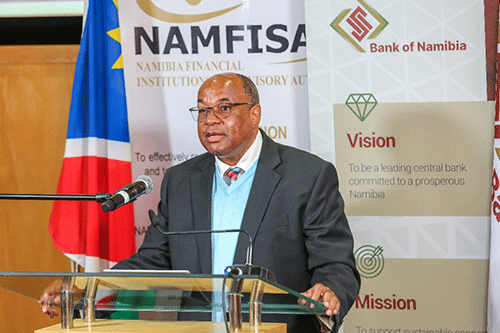Bank of Namibia governor Johannes !Gawaxab called for adjustments in administered prices in the housing, utilities and energy sub-sectors to prevent runaway inflation.
“This time calls for the effective use of stabilisation mechanisms at our disposal, in addition to monetary policy to stabilise the general price level and inflation ultimately,” said the governor. Administered prices are prices of goods set by the internal pricing structures of firms that take into account cost rather than through the market forces of supply and demand.
!Gawaxab made these remarks last week during the launch of the 2022 financial stability report. Inflationary pressures continue to build up, worsened by the Russia- Ukraine conflict, which led to significant increases in food and energy prices and further impacted supply chains.
Therefore, the current inflation environment presents a difficult policy trade-off between protecting the most vulnerable from rising fuel and food costs amidst the necessary policy tightening.
“ C o n s e q u e n t l y , households who spend a large portion of their income on food and transportation already feel the effects due to their purchasing power, which has been eroded by rising inflation. Despite that, the recent inflation uptick is on account of supply and external factors over which the bank has limited control.
The preoccupation of central banks is to mitigate against second-round effects that such inflation pressures could cause,” stated !Gawaxab. In this regard, the bank raised the policy rate in the last monetary policy committee meeting. This monetary policy stance was pursued to ensure that the peg between the Rand and Namibia Dollar is supported and thus mitigates against imported inflation, and that domestic inflation expectations from households and firms do not translate into a higher inflation outcome, and that credit conditions remain moderate and do not add demand pressure which feeds into imported inflation, and inflation volatility remains low and less risky to financial stability.
The slower growth and rising prices, coupled with the Ukraine conflict and tightening financial conditions, will exacerbate the difficult policy tradeoff between supporting the recovery and containing inflation and debt.
In his budget statement this year, finance minister Iipumbu Shiimi said on the economic growth front, the domestic economy was projected to grow by 1.2% in 2021, with bright prospects for the short to mediumterm.
In this regard, growth was projected to increase to 2.9% in 2022 before accelerating further to 3.7% in 2023. Also, Namibia Statistics Agency (NSA) CEO Alex Shimuafeni stated that in March 2022, the annual inflation rate increased by 4.5%, compared to 3.1% recorded in March 2021.
On a monthly basis, the inflation rate stood at 0.5%, compared to 0.2% recorded a month earlier. The main contributors to the annual inflation rate were mainly transport (1.9 percentage points) and food and nonalcoholic beverages (0.9 percentage points).


